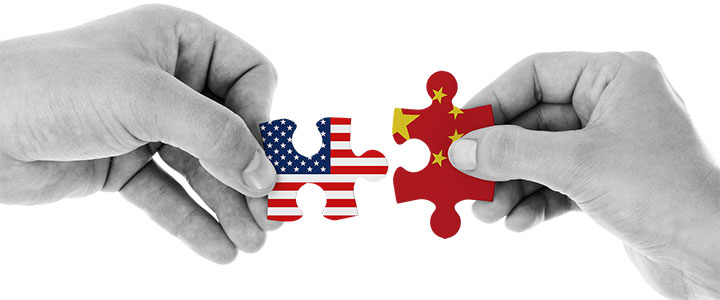
A recent report by the United Nations Conference on Trade and Development (UNCTAD) warns of the disparities occurring in development of the data economy and, more specifically, in its application to an area of enormous potential, Artificial Intelligence (AI). The ‘Digital Economy Report 2021. Cross-border data flows and development: For whom the data flow’ details somewhat crudely a panorama that has been worrisome for the EADT since its beginnings: A China-US duopoly is being built, in which all the rest, and also Europe, of course, would be little more than just data providers.
According to the report, China and the United States have the highest adoption rates in the world of 5G. In the last five years, they have contributed 94% of all financing for new AI companies and employ 70% of the most advanced researchers in this area.
And their geopolitical power acts in synergy with corporate power. Apple, Microsoft, Amazon, Alphabet (Google), Facebook, Tencent and Alibaba – the top five from the United States, the other two Chinese – account for almost 90% of market capitalisation of the world’s largest digital platforms. And rising, as they have benefited from the drive toward digitalisation caused by the pandemic. Thus, always citing data from the report, while the composite index of the New York Stock Exchange grew by 17% between October 2019 and January 2021, the value of the major platforms rose by between 55% (Facebook) and 144% (Apple).
With their huge financial muscle, these companies are clearly betting on the data economy, investing in many of the links in their value chain, such as submarine cables and satellites. “They have become planetary global digital corporations; they have acquired enormous financial, technological, and market power, as well as controlling vast amounts of data about their users”, says UNCTAD.
Given this scenario, the United Nations warns of the very real risk that developing countries will become “mere providers of raw data for global digital platforms”. Moreover, the cruel irony is that they would end up having to pay for the applications from Digital Intelligence – obtained based on their data.
The report emphasizes the need to establish global data governance, a debate that, as the text itself recognises, is at an impasse. Facing this block, it calls for intermediate solutions that take into account “all dimensions of data, both economic and non-economic”, that is, human rights, national security, taxation, etc. Meanwhile, “self-regulation has created market structures defined by the platforms, predominantly for their own benefit”.
The EU’s response
In the absence of global governance of digital platforms, European Union bodies have been working for months on the Data Governance Act, with the goal of creating, as Thierry Breton, the European Commissioner for Internal Market, put it, “a single market, open and sovereign”. The purpose of the act is to encourage the transfer of data with confidence and to create a European space for data, equipped with technological infrastructures and governance mechanisms.
In this proposal from the Commission, what we find especially interesting is the focus on reuse by the authorities of anonymised or pseudoanonymised protected data in areas such as health and education. Obviously, the reuse of data must be non-discriminatory, proportionate, and objectively justified, with the goal of improving how public services are provided.
Europe can, and indeed must, create its own governance model. But this is only part of the journey. The challenge is for our model to be adopted beyond the EU. Without global governance, as the United Nations report says, “there is a risk that a silo-oriented, data-driven digital economy will emerge”, a “suboptimal situation” in economic terms. We need a model that is global and competitive, one in which everyone can benefit from the enormous potential of Artificial Intelligence.




